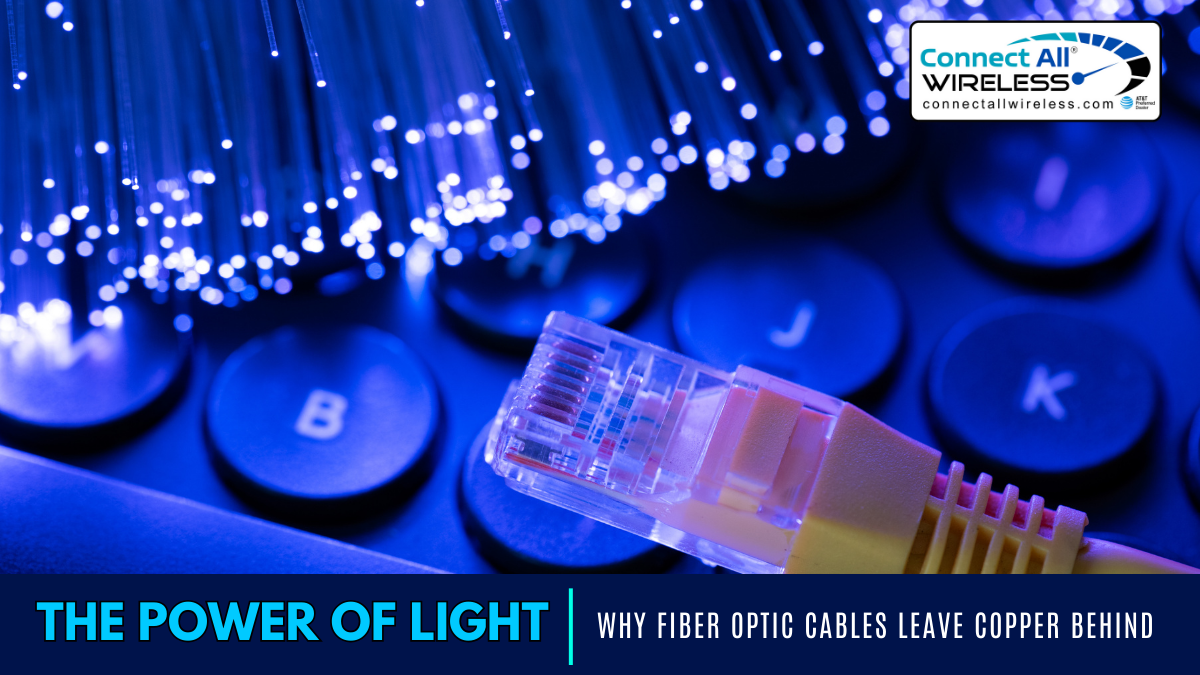The Power of Light: Why Fiber Optic Cables Leave Copper Behind
January 9, 2024In the realm of data transmission, the ongoing debate between fiber optic cables and traditional copper wires often surfaces. While both serve as mediums for carrying information, the technological superiority of fiber optics is undeniable. The key lies in the power of light—fiber optics leverage light signals to transmit data, surpassing the limitations that copper cables encounter. Let’s delve deeper into why fiber optic cables are leaving copper behind in the race for efficient data transmission.
1. Speed:
Fiber optic cables operate at the speed of light, quite literally. These cables use light signals to convey data, enabling transmission at speeds approaching the velocity of light itself. Copper wires, on the other hand, transmit electrical signals, which inherently move slower. Consequently, fiber optics boast significantly higher data transfer rates, making them the preferred choice for applications demanding rapid communication, such as high-speed internet and data centers.
2. Bandwidth:
Fiber optic cables possess a far broader bandwidth compared to copper wires. The capacity to carry more data over greater distances without signal degradation is a distinctive advantage of fiber optics. While copper cables encounter signal loss and interference over extended distances, fiber optics maintain data integrity over considerable lengths, facilitating long-distance communication without compromising quality.
3. Reliability:
In terms of reliability, fiber optic cables surpass copper due to their immunity to electromagnetic interference (EMI) and radio-frequency interference (RFI). Copper wires are susceptible to these interferences, which can degrade signal quality and reliability, especially in environments with high electrical noise. Fiber optics remain unaffected by such interferences, ensuring consistent and reliable data transmission even in challenging settings.
4. Security:
Another area where fiber optics excel is security. Copper cables emit electromagnetic signals that can be intercepted, compromising data confidentiality. In contrast, fiber optic signals are more challenging to tap without disrupting the transmission, enhancing the security of transmitted data. This attribute makes fiber optics a preferred choice for sensitive applications like government communications and financial transactions.
5. Durability and Maintenance:
Fiber optic cables are not only superior in performance but also in durability. They are less prone to damage from environmental factors like moisture and temperature variations compared to copper wires. Additionally, fiber optics require less maintenance over time, reducing the overall operational costs associated with upkeep and replacements.
6. Future-Proof Technology:
As technology advances, the demand for higher data transfer speeds and larger bandwidths continues to grow. Fiber optic cables, with their inherent capabilities, represent a more future-proof solution compared to copper wires. Investing in fiber optics ensures readiness for upcoming technological advancements without the need for frequent infrastructure upgrades.
Overall, the ascendance of fiber optic cables over copper wires is primarily attributed to their reliance on light signals for data transmission. The unparalleled speed, greater bandwidth, reliability, enhanced security, durability, and future-ready nature position fiber optics as the optimal choice for various communication needs. While copper cables served as the backbone of communication for decades, the evolution of technology has propelled fiber optics to the forefront, offering unmatched performance and efficiency in the digital age.
Conclusion
In the world of connectivity, the ascendancy of fiber optic cables is undeniable. Their reliance on light signals ensures unparalleled speed, greater bandwidth, enhanced reliability, and superior security compared to traditional copper wires. Michigan, known for its technological strides, is witnessing the transformation brought by fiber optic internet.
Embracing this advanced technology signifies a leap towards the future. Choosing the best fiber internet in Michigan means opting for unmatched speed, reliability, and future-ready infrastructure. It’s a choice that propels not just communication but the entire technological landscape into a realm of limitless possibilities. As fiber optics leave copper behind, they pave the way for a more connected, efficient, and progressive Michigan, setting new standards for digital connectivity and innovation.


